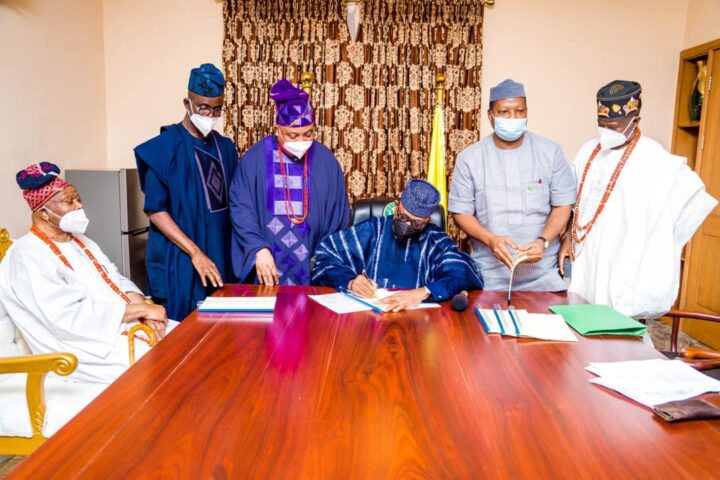Governor of Ogun state, Dapo Abiodun has assented to a bill which makes provisions for family members of traditional rulers to “have a say” during the burial rites of monarchs.
The ‘Obas, Chiefs, Council of Obas and Traditional Council Law of Ogun State, Bill 2021’ also makes provisions for the selection and appointment of traditional rulers.
The bill, which was presented for public hearing in July 2021, had generated some controversy, with some traditionalists insisting that the state was trying to interfere in cultural practices.
Abiodun in his remarks after signing the bill on Monday said the law addresses areas of ambiguity as it relates to the role of family members during the burial rites of traditional rulers.
“I believe that one of the unique things about this law, besides the fact that it sets out a method for the selection of obas and chiefs, is the clarity that this law now provides as it relates to the passage rites of our kabiyesis,” the governor said.
“This law seeks to improve on previously existing western region laws, or where there had been ambiguity as it relates to how our kabiyesis will be buried. This law now empowers the families to determine how our kabiyesis will be buried, of course without prejudice to traditional rites that are meant to be performed by customary law.
“However, it now clarifies and removes any ambiguity about the fact that the families of our kabiyesis now have a say in how they want our royal fathers to be buried.”
Present at the signing of the bill were Sikiru Adetona, the Awujale of Ijebuland; Babatunde Ajayi, the Akarigbo of Remoland, and Kehinde Olugbenle, the Olu of Ilaro.
Abiodun thanked the traditional rulers for their input, as well as other stakeholders such as the attorney-general of the state, and the house of assembly.
“I want to really thank kabiyesi Awujale because he was very persistent to ensure that we review the existing law in consonance with the constitution of the Federal Republic of Nigeria. I want to commend the Akarigbo for following up on the process, and ensuring that this law is being passed under his watch,” he said.
“I want to appreciate the attorney-general for the input he had to make before the draft was presented in the house of assembly.
“I want to particularly thank the house, because like the speaker said, this bill – before it became law – went through a rigorous exercise. It was subjected to input from the public and I understand that the public sitting drew more attention than any public sitting that the assembly has had in recent times, because of the interest that people had in how our chiefs and obas will be appointed and how our kabiyesis will be interred upon their eventual passing.”
